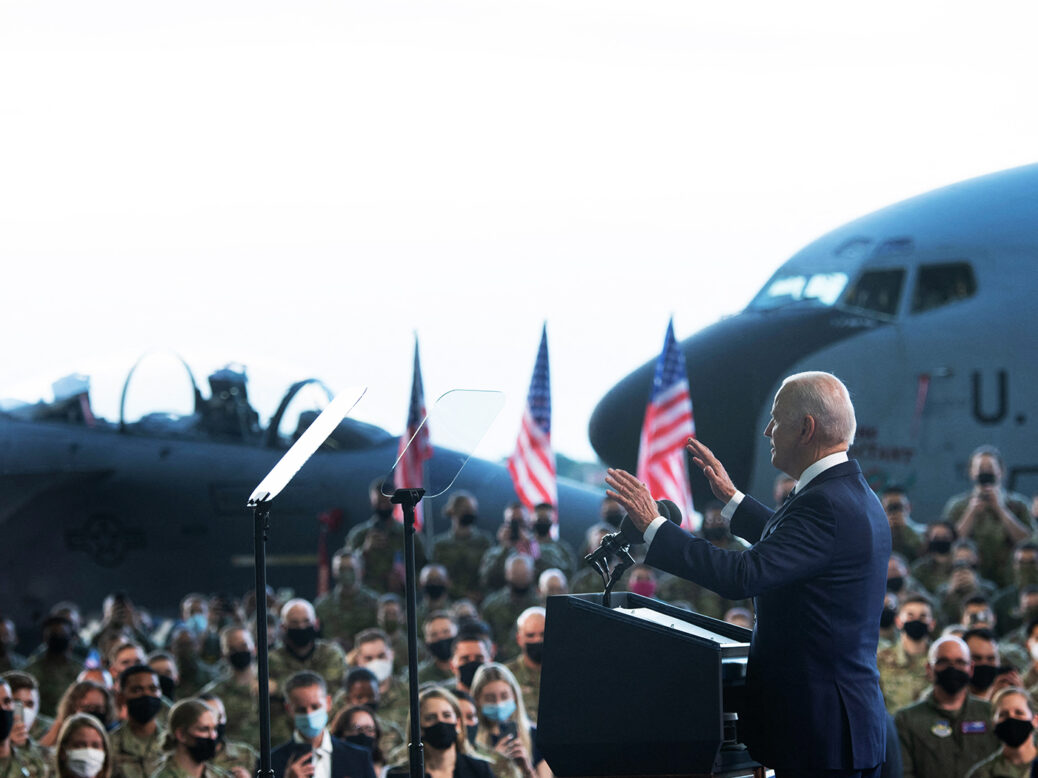
WASHINGTON, DC – Joe Biden came into office as president with lofty foreign policy positions. The United States was going to bring democracies together to counter authoritarianism. It would stand strong to counter China. America was back and would work in concert with its European allies.
One year in, America’s foreign policy focus is this: Russia has amassed troops on the border of Ukraine. The Biden administration has sent aid to Kyiv and warned that invasion may be imminent.
As for standing strong with allies, the UK has taken an assertive stance, warning that Russia is trying to install a pro-Kremlin leader in Kyiv. But Germany blocked Estonia from sending military hardware to Ukraine, and France has played down the threat of an invasion. All of which is to say: “Western” democracies are divided and Russia, not China, is dominating the headlines.
The Biden administration, in other words, has found out that, if the devil is in the details, so is the reality of foreign policy.
“I think what’s happened in the last couple months is that much smaller — although still very significant — occurrences can throw an entire vision, if not off course, then off-kilter,” said Rachel Rizzo, a senior fellow at the Atlantic Council’s Europe Centre.
[See also: Russia’s build-up at the borders of Ukraine is testing the West’s resolve]The United States cannot focus on China and Asia more broadly and expect to be able to make a clean exit from, or even lessen its attention to, its entanglements in other regions, be they the Middle East, Central Asia, or Europe. The withdrawal from Afghanistan showed Washington — and Moscow — that.
Meanwhile, if the Biden administration thought that Russia’s build-up of troops on the Ukrainian border would have been an opportunity to show transatlantic solidarity, it has been disappointed. The US has insisted that it stands united with all its allies, but Germany has shown hesitancy and France is embarking on independent efforts at negotiation. Russia threatening to invade Ukraine is as clear a test of Biden’s theory of democracies challenging aspiring autocracies as could exist. Ukraine is asserting its right to national self-determination, and yet the US and its democratic allies have, despite protestations to the contrary, struggled to get on the same page, much less remain there.
The implications of the threat of a Russian military invasion into Ukraine for the Indo-Pacific are also as yet unclear. Last summer, the surprise announcement of a pact focused on the Indo-Pacific between the US, UK and Australia (Aukus for short) caused a rift with France, with whom Australia cancelled a submarine contract. Some analysts have since theorised that what the Biden administration really wanted was for the Europeans to focus on their own neighbourhood, freeing up the US to concentrate on the Indo-Pacific and China. Clearly that has not come to pass.
The US has made overtures to India to co-operate to counter China, and India has been increasingly amenable. India, however, is also a longtime partner of Russia, from which it receives the vast majority of its defence equipment. So far the US has made allowances, refusing to allow India’s purchase of the S-400 air defence system from Russia to damage US-Indian relations, but it is not yet clear whether further sanctions on Russia or tension between Washington and Moscow would cause problems.
America’s messy withdrawal from Afghanistan may have further shaken its allies’ and partners’ trust. Some surely worry that, when the chips are down, the US cannot be counted on to stand by those to whom it has made promises.
There is also a certain irony that two of the foreign policy areas for which Biden was best known while he served as Barack Obama’s vice-president — Afghanistan and Ukraine — have proven such thorns in his administration’s side. Biden was known both as the figure who opposed the surge in Afghanistan and who advocated support for Ukraine. As president he withdrew from Afghanistan and is sending military support to Ukraine. Biden’s positions here are not surprising but, then, the US is not the only global power that gets to take a position.
That doesn’t mean all is lost for the Biden administration’s foreign policy goals.
“Barring the worst-case outcome — a Russian ground invasion — tensions over Ukraine are unlikely to undercut the administration’s efforts to rebalance US foreign policy towards the Asia-Pacific and to accord top strategic priority to enhancing Washington’s competitiveness vis-à-vis Beijing,” Ali Wyne, a senior analyst at Eurasia Group, said. Wyne did acknowledge, though, that sustained tension between the US and Russia “could strengthen the Sino-Russian entente whose momentum US policymakers seek to slow”. And it is entirely possible that, in the long run, this latest crisis could strengthen transatlantic solidarity — and suspicion toward Moscow.
Still, the reality remains that the Biden administration, as Rizzo said, came in with a “a broad, sweeping view of how the world should be and how we want to shape it”. “What we’ve seen happen”, she said, is that “the world shapes us and shapes our strategy, rather than the other way around”.
[See also: Is Vladimir Putin preparing for war?]





